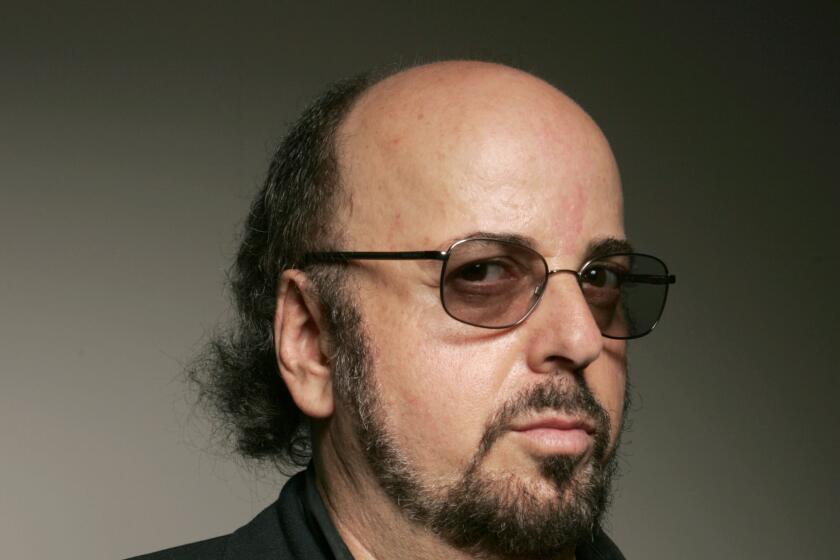Pollack’s way with actors
- Share via
Sydney Pollack, who died Monday of pancreatic cancer, was not an auteur director. He was, however, a brilliant storyteller, comfortable working in every genre: dramas, comedies, political thrillers, even westerns.
A former acting teacher, his major strength as a director was his extraordinary ability to bring out perfectly nuanced performances. His collaboration with Robert Redford led to some of Pollack’s best films, including 1985’s “Out of Africa,” which won him the best director Oscar.
Pollack also had a strong track record as a producer of such films as “Iris,” “The Quiet American,” “Cold Mountain” and “Michael Clayton,” which received a best picture Oscar nomination. (Pollack also appeared in the film as Clayton’s high-powered boss.)
Here’s a look at some of Pollack’s more memorable work, both behind and in front of the camera.
“War Hunt” (1962): Pollack taught acting at the Neighborhood Playhouse in New York from 1954 to 1960 -- taking two years off to serve in the Army. He got his first taste of directing in 1959, when director John Frankenheimer hired him to coach the two young stars of a production of “The Turn of the Screw.” Two years later, Frankenheimer called on Pollack for the same services for the young actors in his 1961 film, “The Young Savages,” starring Burt Lancaster. The following year, Pollack made his film acting debut along with Redford in this low-budget Korean War thriller. But he wouldn’t pursue acting, putting that aspect of his career on the back burner to direct.
“The Slender Thread” (1965): Lancaster was so impressed with Pollack’s work on “The Young Savages” that he called Universal Studios kingpin Lew Wasserman to see if he could give the young man some directing work. He did. For six months, Pollack earned $75 a week to watch and learn the craft on the sets of TV productions. Pollack made his theatrical debut with this taut suspense drama starring Sidney Poitier as a student volunteer at a medical clinical who receives a call from a suicidal woman (Anne Bancroft).
“This Property Is Condemned” (1966): Though reviews were mixed for Pollack’s second film as a director, this romantic melodrama, set in the Depression-era South, is beautifully shot by the legendary James Wong Howe and features Natalie Wood in her Golden Globe-nominated performance as a young woman whose sleazy mother (Kate Reid) runs a boardinghouse for railroad workers. The movie also marks the first time Pollack directed his pal Redford, who plays a railroad efficiency expert.
“They Shoot Horses, Don’t They?” (1969): Pollack received his first Oscar nomination for best director for his riveting work on this harrowing drama based on Horace McCoy’s story. Set during the Great Depression, the drama revolves around a group of disparate losers, drifters and unemployed people who sign up for a grueling dance marathon. “Horses” holds the record for the most Oscar nominations earned -- nine -- without receiving one for best picture. Jane Fonda got her first Oscar nomination for best actress as a lonely young woman at the end of her rope.
“Jeremiah Johnson” (1972): Pollack and Redford collaborated again for this sturdy western drama. Redford plays the title role to stoic perfection -- that of a man who decides to drop out of society to become a trapper in the Rocky Mountains.
“The Way We Were” (1973): The Pollack/Redford duo hit pay dirt the following year with this romantic drama that spans three decades in the ill-fated love affair between a Jewish intellectual radical (Barbra Streisand) and a handsome, though shallow, WASP writer (Redford). Pollack elicits magical performances from the two stars; the chemistry between the two is indescribably special. The lush Marvin Hamlisch score and Streisand’s warbling of the title tune also added to the film’s universal appeal. The score and the song won the Oscar; Streisand received a best actress nomination and Redford won many a heart.
“Three Days of the Condor” (1975): Many great political thrillers emerged during the 1970s, including “The Parallax View,” “All the President’s Men” and this crackling entry from Pollack. Redford -- who else? -- plays a bespectacled reader for a CIA front who is forced to flee his office after all of his colleagues were mysteriously murdered while he was out to lunch. Faye Dunaway works well with Redford as a young woman he kidnaps in order to use her apartment as a hide-out. Of course, she ends up helping him.
“Tootsie” (1982): Pollack received his second best director Academy Award nomination for this delightful gender-bender comedy. Dustin Hoffman earned an Oscar nomination for his deft turn as a self-centered, unemployed New York actor who decides to disguise himself as a woman to get a job on a daytime soap opera. Not only does he get the job, he becomes an overnight sensation. Jessica Lange earned a supporting actress Oscar as his costar, with whom he falls in love.
“Out of Africa” (1985): Pollack picked up his best director Oscar for this lush romantic drama based on the memoirs of Isak Dinesen, the nom de plume of Danish writer Karen Blixen. Winner of seven Academy Awards, including best film, “Out of Africa” is a real treat for fans of the romantic epic genre. Meryl Streep gives another one of her accent-perfect performances as Blixen, who operates a Kenyan coffee plantation. And Redford cuts a dashing figure as British hunter Denys Finch Hatton.
“The Firm” (1993): After the disastrous 1990 romantic drama “Havana” -- his final collaboration with Redford -- Pollack returned to form in this solid legal thriller based on the John Grisham novel. Tom Cruise plays a young Harvard graduate who joins a Memphis, Tenn., law firm after he is seduced by its wealth and perks. But unknown to him, the firm has strong ties with organized crime, and the only way to leave is in a body bag.
“The Interpreter” (2005): Pollack’s return to the political thriller genre wasn’t warmly received by critics or audiences. Nicole Kidman plays a U.N. interpreter for a small African country who overhears an assassination attempt. Sean Penn plays the federal agent who believes Kidman knows more than what she’s saying.
Also from 2005 was “Sketches of Frank Gehry,” Pollack’s first documentary, on the famed Los Angeles-based architect.
--
More to Read
Only good movies
Get the Indie Focus newsletter, Mark Olsen's weekly guide to the world of cinema.
You may occasionally receive promotional content from the Los Angeles Times.











